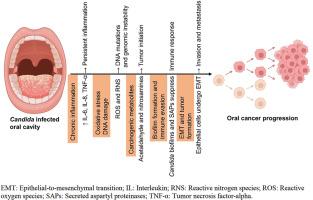Role of Candida albicans in chronic inflammation and the development of oral squamous cell carcinoma
IF 2.8
引用次数: 0
Abstract
Oral cancer pathogenesis is significantly influenced by Candida species, especially C. albicans, through chronic inflammation and cellular dysregulation. Epidemiological studies highlight a strong correlation between persistent Candida infections and oral carcinogenesis. Experimental evidence has identified key biomolecular mechanisms, including biofilm formation, epithelial invasion, and immune evasion. Chronic inflammation induced by Candida fosters a pro-tumorigenic environment characterized by oxidative stress, cytokine imbalance, and genomic instability. Animal models of Candida-induced oral lesions offer insights into premalignant conditions, and case series studies further support the association between fungal infections and oral cancer. This review critically examines the role of Candida, particularly C. albicans, in oral squamous cell carcinoma (OSCC) pathogenesis by analyzing epidemiological, experimental, and mechanistic data. We emphasize the importance of early detection and therapeutic strategies, including antifungal prophylaxis, to manage Candida colonization in cancer patients. A comprehensive literature search of studies published between 2015 and 2025 was conducted using Pub Med, Scopus, and Web of Science. Key findings were synthesized to understand the relationship between Candida infections and OSCC. The persistent Candida infections create a pro-tumorigenic microenvironment that accelerates dysplastic changes and malignant progression, particularly in high-risk individuals. While the direct causative relationship is complex, the combined effects of Candida, tobacco, alcohol use, and immunosuppression are significant in oral carcinogenesis. Early detection, antifungal treatments, and personalized therapies are essential to improving patient outcomes. A multidisciplinary approach involving oncologists, microbiologists, and immunologists is crucial for developing integrated strategies to manage both Candida infections and cancer. Future research should focus on dual-action therapies targeting both Candida-induced inflammation and tumor progression.

白色念珠菌在慢性炎症和口腔鳞状细胞癌发展中的作用
口腔癌的发病机制受念珠菌种类,特别是白色念珠菌,通过慢性炎症和细胞失调显著影响。流行病学研究强调了持续性念珠菌感染与口腔癌发生之间的强烈相关性。实验证据已经确定了关键的生物分子机制,包括生物膜形成、上皮侵入和免疫逃逸。念珠菌诱导的慢性炎症促进了以氧化应激、细胞因子失衡和基因组不稳定为特征的致瘤环境。念珠菌引起的口腔病变的动物模型提供了对恶性前病变的见解,病例系列研究进一步支持真菌感染与口腔癌之间的联系。本文通过分析流行病学、实验和机制数据,批判性地探讨了念珠菌,特别是白色念珠菌在口腔鳞状细胞癌(OSCC)发病机制中的作用。我们强调早期发现和治疗策略的重要性,包括抗真菌预防,以管理癌症患者的念珠菌定植。使用Pub Med、Scopus和Web of Science对2015年至2025年间发表的研究进行了全面的文献检索。综合关键发现,了解念珠菌感染与OSCC之间的关系。持续的念珠菌感染创造了一个促肿瘤的微环境,加速了发育不良的改变和恶性进展,特别是在高危人群中。虽然直接的因果关系是复杂的,念珠菌、吸烟、饮酒和免疫抑制的综合作用在口腔癌的发生中是显著的。早期发现、抗真菌治疗和个性化治疗对改善患者预后至关重要。涉及肿瘤学家、微生物学家和免疫学家的多学科方法对于制定管理念珠菌感染和癌症的综合策略至关重要。未来的研究应侧重于针对念珠菌诱导的炎症和肿瘤进展的双作用疗法。
本文章由计算机程序翻译,如有差异,请以英文原文为准。
求助全文
约1分钟内获得全文
求助全文
来源期刊

Cancer pathogenesis and therapy
Surgery, Radiology and Imaging, Cancer Research, Oncology
CiteScore
0.80
自引率
0.00%
发文量
0
审稿时长
54 days
 求助内容:
求助内容: 应助结果提醒方式:
应助结果提醒方式:


